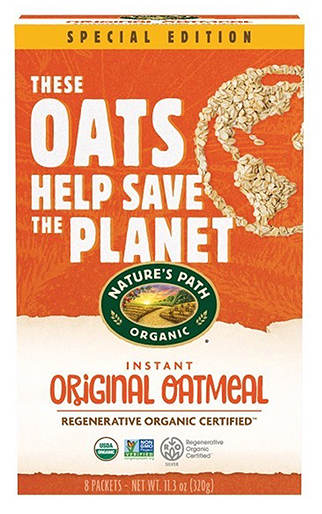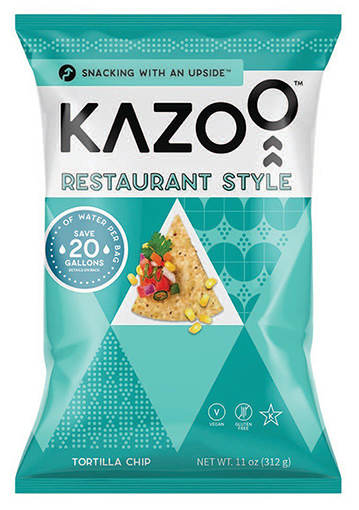Looking back on the past two years of a global pandemic, we see how a handful of megatrend forces are continuing to shape change in the world. First, we experienced a shared global crisis (the pandemic is a first in our lifetime) that impacted lives both short and longer term in similar ways around the world. Second, the economic crisis that was precipitated and magnified by the pandemic shines a spotlight on existing inequalities and deepening societal divides. Third, all of us face the consequences of climate change, one of the biggest issues and opportunities now impacting the food and beverage industry worldwide. The good news is that crises open the door for rebuilding in a more sustainable and equitable way.
The planet comes to the fore
For several years in a row, the list of Innova Market Insights Top 10 Trends has been headed by issues that touch on sustainability through storytelling, transparency, and building consumer trust in brands. This changed in our trends forecast for 2022. The top trend, “Shared Planet,” shifts direct focus onto environmental issues and the need for consumers and industry to work together on solutions for big problems on a planet level.
Although industry is a key and vital player, its reputation around sustainability is under attack. Companies are being criticized for announcing lofty eco policies and goals that are difficult for them to uphold. Some have been accused of “greenwashing” in order to boost their reputation and profits. In a capitalist world, balancing environmental needs with the demands of shareholders is tricky. That is one reason why shared efforts are so important.

Nature's Path introduced a limited edition Regenerative Organic Certified (ROC) Oatmeal. All the ROC oats are grown using certified ROC farming practices, on a farm owned by the company's founders in Saskatchewan, Canada. Photo courtesy of: Nature’s Path Foods Inc.
Consumers do care about the environment. In the Innova Lifestyle & Attitudes Surveys of 2020 and 2021, consumers were asked about the overriding global issues that most concern them. Consumer priorities shifted in the 2021 survey. Even in the middle of a global disease pandemic, consumers showed greater concern for the health of the planet than for the health of the population. Previously, planet health was second. This shift is most pronounced in the Americas and Europe, with consumers in the US and Brazil, as well as the UK and Spain, swinging toward concern about the planet as the most important global issue.
Sustainability is another environmental topic that resonates with consumers. Over half of global consumers participating in Innova’s 2021 Lifestyle & Attitudes Survey say that sustainability is of major importance. Research shows that many are now taking direct action to be more environmentally responsible in their choices.
Big environmental issues
Consumers have differing definitions of sustainable actions related to top environmental issues. When asked about various aspects of environmental responsibility, consumers expressed highest levels of care regarding animal cruelty, plastic waste and food waste. Level of care corresponded somewhat to the salient and most publicized regional issues in each region, for example, water shortages and deforestation in Latin America and plastic waste and ocean pollution in Europe. In North America, not only do environmental concerns—namely ocean pollution, water shortages, and air pollution—trail behind animal and human welfare, but overall levels of concern are lower than in other regions of the world.

PepsiCo introduced pep+ (pep Positive), a strategic end-to-end transformation with sustainability at the center of how the company will create growth and value by operating within planetary boundaries and inspiring positive change for the planet and people. Photo courtesy of: PepsiCo Inc.
Level of care does not always translate into action, so the Innova 2021 Trends survey asked consumers about actions taken in the previous 12 months to be more environmentally responsible in food choices and eating habits.
Reducing waste, a relatively simple action, had the highest response rate, at 43% globally. Additionally, noticeable proportions of survey participants said that they adjusted their product choices for other environmental reasons, with one-quarter choosing products with environmentally friendly or less packaging, and one-fifth choosing foods with less environmental impact. Although consumers demonstrate clear interest in cutting waste, their primary action appears to be buying less, with 57% saying that they buy only as much food as they need to consume.

Kazoo Snacks, Dallas, says every bag of Kazoo Tortilla Chips is made using 40% upcycled corn germ, repurposed from the nation's corn starch industry, which produces germ as a by-product. Officials say reclaiming and upcycling reduces Kazoo's water footprint by at least 20 gallons of water per bag. Photo courtesy of: Kazoo Snacks
Industry increasingly is doing its part toward sustainability. Launches of food and beverage products carrying environmental claims are growing at three times the pace of total food and beverage launch activity. Ethical on-package claims regarding the environment increased their share of total food and beverage launches from 4.4% in 2016-2017 to 6.6% in 2020-2021.
These claims take different forms. For example, the label for the French Hipp Organic Vegetables and Semolina for Babies From 6 Months includes statements regarding climate protection and respect for soils, along with recyclable packaging.
Growth is strong around specific issues. In the five years ending Q3 2021, launches of food and beverage products using upcycled ingredients rose at a compound annual growth rate (CAGR) of 122%, although just one in three consumers currently say that a product with upcycled ingredients is more appealing than other products. Compound annual growth rates during the same five-year period also are robust for recycled plastic (59%), water saving claims (49%), carbon emission claims (47%), and freedom from palm oil (39%).
The prolonged drought in the American southwest has turned water conservation into a hot button issue in that region. This Beer Saves Water, by Arizona Wilderness Brewing Co, Gilbert, Ariz., is brewed with drought-resistant hops and malt. Kazoo Snacks, Dallas, achieves water savings through upcycling, stating that its Kazoo Bite Sized Tortilla Chips are made with 40% upcycled corn germ to reduce the company’s water footprint by at least 20 gallons per bag (compared with 100% new growth corn).
Labels and messaging
Consumers have high expectations for industry to take action toward and communicate about sustainability. More than three in four global consumers agree that food and beverage companies need to be more transparent about the packaging materials used and should state clear recycling guidelines for consumers on the packaging.

Consumers do notice on-package communications. Half of those surveyed globally in the Innova 2021 Trends Survey say that they pay attention to environmental labels on packs and 61% say that if they see a new eco label they try to understand it. Among the newest eco labels are the Upcycled Certified logo, recently displayed on quinoa squares from CaPao, a mission-based start-up snack brand created by Mondelēz International's SnackFutures innovation and venture hub. Image courtesy of: Innova Market Insights
Consumers do notice on-package communications. Half of those surveyed globally in the Innova 2021 Trends Survey say that they pay attention to environmental labels on packs and 61% say that if they see a new eco label they try to understand it. Among the newest eco labels are the Upcycled Certified logo, recently displayed on quinoa squares from CaPao, a mission-based start-up snack brand created by Mondelēz International's SnackFutures innovation and venture hub.
Many food and beverage manufacturers target a specific issue that is most relevant to their own products, for example, plastic use in beverages. Others try to quantify their environmental impact for factors such as carbon emissions. Packaging suppliers can offer innovations that enable manufacturers to make sustainability claims. For example, Tetra Pak recently introduced an enhanced UHT 2.0 portfolio to help UHT milk processors significantly reduce consumption of electricity, steam, and freshwater, and cut their carbon footprint by more than half.
Label overload can be a problem for many consumers. More than half believe there are too many environmental labels that are hard to keep up with and nearly two-thirds say they would prefer a single label indicating the overall environmental impact. A similar proportion also says that they want to see the level of environmental impact illustrated as a score or grade. New programs are emerging to give overall scores and ratings to help consumers compare and measure sustainability features.
The cost barrier
"Industry increasingly is doing its part toward sustainability. Launches of food and beverage products carrying environmental claims are growing at three times the pace of total food and beverage launch activity."
Cost could be a barrier to adoption of environmentally friendly products, particularly among consumers who say that environmentally friendly products are more expensive and that cost prevents them from shopping “green.” Not surprisingly, high-income consumers are more willing to pay higher prices for environmentally friendly goods.
Considering specific issues, consumers are most willing to accept higher prices to deal with plastic waste. Furthermore, although more than 60% of global consumers surveyed said they were willing to pay extra to tackle the problem of food waste, only 25% were prepared to pay more for products with upcycled ingredients and 28% said they expected to pay less.
Toward a more sustainable future
Innova’s consumer research during the past two years has shown that consumers expect manufacturers, governments and consumers themselves to work together to deal with the world’s environmental problems. Ongoing development in simpler labeling and more digital tools should make it easier for consumers to play their part in the future.
Brands are moving toward meeting clear, agreed upon, and understandable measurements of their environmental and social impact. They need to work together with each other and consumers to build trust in the claims of a positive climate impact, ensuring universal acceptance of certifications and greater public faith in the transparency of brand actions.
